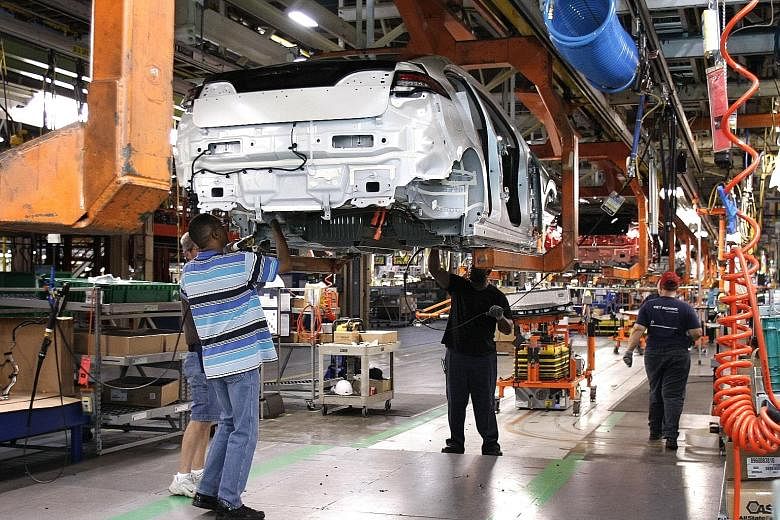US President Donald Trump and his economic team love manufacturing. That much is clear from his speeches; from what his strategist Steve Bannon has said about his self-avowed economic nationalism; and from his trade adviser Peter Navarro's attacks on Germany and stated goal to repatriate international supply chains.
There is a certain method in their factory worker machismo. As a matter of economic logic, a fetish for mercantilism - exports are good, imports are bad - goes hand in hand with one for manufacturing. The high productivity of manufacturing means a country with a large proportion of its workforce in factories needs to ship a lot of its output abroad: It will simply be producing too many goods for its own population to consume.
Since it is harder to import services than goods, an industrial power will find it difficult to consume the full value of its excess production. Instead, it tends to become a financial creditor to the rest of the world, lending funds to its customers to buy its goods.
On a global level, there is only so much demand for manufacturers, and therefore only so many manufacturing jobs to be had. Only in a few countries, therefore, can manufacturing be the preponderant economic activity.
For the past two generations, there are three countries that have traditionally been producers of goods to the world: Germany, Japan and China. It is no coincidence that these have been both industrial powerhouses and surplus economies.

The economic nationalism of President Trump and Messrs Navarro and Bannon can be described as Germany-envy.
In those manufacturing powers, they see countries that have fought to hold on to the good, manly jobs that validate the status of the native working class.
Like so often with machismo, the envy is rooted in insecurity - a feeling of inadequacy compared with the perceived strength sported by these economies. Since export surpluses cannot be enjoyed by all countries (unlike broader gains from trade), manufacturing fetishism leads logically to a zero-sum view of trade policy.
It entails an attempt to displace the current surplus of manufacturing producers. Thus, in the context of a Germany-envying inferiority complex, the desire to repatriate global supply chains, limit imports and boost manufacturing makes sense.
But, outside the fetishists' fantasies, it will not produce the desired effect. First, manufacturing machismo itself is a handicap when it comes to grasping the opportunities for a thriving economy. By far the largest number of jobs to be created in the United States over the next decade will be in services, in particular the caring professions.
Factory fetishists might retort that it is this development they want to oppose by resurrecting factory employment. But this runs headlong into a second obstacle.
Regardless of trade, automation is reducing the need for manufacturing jobs everywhere.
As the economist Brad DeLong pointed out in a recent essay, that is true in Germany, too, which has seen a fall in factory employment almost as sharp as in the US (the same holds for Japan).
Yes, manufacturing employment may be higher in Germany, and factory fetishists can regret that the US did not fight harder to hold on to dwindling manufacturing employment. But doing so would do nothing to stop the overall decline. No advanced economy, whether the US or Germany, will ever return to the high manufacturing employment shares of the mid-1970s or earlier.
Besides, many German workers have faced long wage stagnation.
All the big industrial economies have chosen to internationalise their supply chains. Things are not as different from the US as the Trump team imagine. If the factory fetishists are obsessed enough to throw themselves into a battle for a steadily shrinking type of employment, they may well find that their most obvious weapons are doubled-edged at best.
Suppose the Trump administration forced through changes in the North American Free Trade Agreement so as to repatriate all parts of the car production process, the most salient of the supply chains Mr Navarro says he wants to bring back. The result will be to make US-produced cars more expensive. How is that going to help expand American car exports?
Or suppose that a border tax, or some other protectionist device, is put in place and successfully cuts imports. This would reduce the living standards of many Americans who would pay more for their consumer goods.
But would it at least reduce the trade deficit or even create a surplus? No, the most likely effect would be to cut exports, too.
Supporters of a border tax argue that the downward pressure on imports will temper the sale of US dollars, causing an appreciation that will rebalance trade. Others cite the "backhaul problem": Shipowners adjust prices to discourage one-way shipments that leave vessels empty on half of their routes. If protectionism means they have fewer imports to bring in, they will charge more to take exports out.
Thus, protectionist policies are likely to shrink imports and exports, leaving the protected economy worse off than before and in no better position even by the misguided measures of the manufacturing fetishists themselves.
Like all visions rooted in insecurity and envy, factory fetishism reflects a real problem. But pursuing it risks producing conflict, with little of the good effect the fetishists expect.
FINANCIAL TIMES

